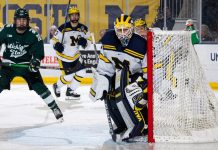If anyone had a chance to make their way to Kelley Rink last Friday and Agganis Arena last Saturday, they saw two hockey games that, for the most part, lacked the excitement of a typical Boston College-Boston University rivalry.
Take away that neither game was close most of the way. Both of these games felt like Red Sox-Yankees games in terms of length. Friday’s game, albeit a nationally-televised game on CBS Sports Network, nearly cracked 3 hours in length. Saturday, a non-televised game, was exactly two-and-a-half hours.
A culprit in extending these games was faceoffs. Without actual statistics to back up this claim, it seemed as though every single faceoff contested over the two nights took about a minute to get the puck dropped.
In 2002, college hockey took steps to speed up the game with the 15-second faceoff. It became mandated that 15 seconds after any whistle (except in the case of a TV timeout), lines needed to be changed and both centers had to be ready for the draw. The punishment for not approaching the faceoff dot within 15 seconds was the violating team’s center being waved out.
Hockey East has done a decent job enforcing this since its implementation. But more recently, the draws have been delayed by the actual protocol of dropping the puck. Centers fail to square off. Wingers encroach into the faceoff circle. The result is an immediate whistle, the ejection of one or both centers from the faceoff and the need to begin the whole process over again.
This most certainly was a major factor in lengthening the games last Friday and Saturday between BC and BU.
“It’s been a league mandate to try to clean up faceoffs,” BC coach Jerry York said. “It certainly adds a lot more to the length of the game. In the BU-BC games, we very rarely had one clean drop.”
York attributes the problems to teams doing whatever they can to get any extra edge possible.
“The players are always trying to get an edge, whether the center or the wings on the side,” said York. “God bless ’em, though, you should try to get an edge, I guess.”
Commissioner Joe Bertagna has noticed, indeed, that every team seems to be looking for that extra something, that “edge” that might help in victory. He said it’s far from just faceoffs where he’s seeing this throughout the league.
“I had a conversation with a coach the other day about how close these games are and how close the standings project to be,” said Bertagna. “There’s a rhythm to a season that I’m used to from doing this so long. And you know when you get to January, there’s a heightened level of tension that you can almost feel because the standings start to take shape. Coaches are starting to realize they’re either on schedule to be where they thought they’d be or they’re not.”
Bertagna said it’s usually about that time that his office begins to get calls from coaches with complaints about either officials or other team’s tactics that they feel are unfair.
This season, that timeline has significantly accelerated.
“The pressure seems to be on people earlier,” said Bertagna. “There are more expectations and coaches have to win. In an odd way, the success of Merrimack puts pressure on other schools where people are saying, ‘They’re doing that. Why aren’t we doing that?'”
Bertagna said that one of the biggest complaints his office has received is about players embellishing and diving in the attempt to, as he put it, “sell a call.”
“I never heard of guys talking about selling a call 10 years ago,” said Bertagna. “Now it’s part of the language. I’ve had people say that you can hear people on the bench telling people, ‘Go down! Go down!’ I don’t think it’s a good development.”
“Diving,” as BU coach Jack Parker likes to call it, was a major part of Friday’s postgame news conference for both Parker and York.
Parker flat out accused BC’s players of diving, saying “[BC’s] diving all over the place. … It’s pathetic that stuff that’s going on out there.”
BC’s York was asked about Parker’s harsh words and turned the tables quickly, intentionally misunderstanding the question.
“The BU players were diving a lot,” he said. “That was a problem all night long.”
For Bertagna, that repartee was simply one more peg in the frustration of players trying to gain the edge through embellishment.
It’s hardly players diving that has Bertagna’s phone ringing so early in the season. A perceived increase in major penalties, partially because of the NCAA’s emphasis on contact to the head penalties, has led a number of coaches to vocalize their ire.
“The NCAA has gone down the road of the automatic five [minutes for certain penalties],” said Bertagna. “There are a lot more calls that, if the officials see them, the player is out of the game. It’s automatic.”
He said his office is consistently receiving video clips for review from coaches asking why a major penalty, and an associated game misconduct, was issued.
“You look at a lot of clips and after a while you realize two people can look at something and come away with an entirely different viewpoint,” said Bertagna. “These are clips you’re slowing down and looking at in the comfort of an office on a Wednesday. The [official] making the call only gets to see it once, in real time.”
Still, he said most times he feels the Hockey East officials are getting the calls correct. He does, though, understand the pain such a penalty can cause a team.
“I had one coach who has lost players five or six times already,” Bertagna said. “So you get coaches saying that this has a huge effect on the game and that we need to put the discretion back into the hands of the officials so they can call two[-minute minors].
“But the rules committee hasn’t seemed like it wants to go in that direction with such calls like hits to the head or hits from behind.”
As for whether he sees such rules changing soon, Bertagna said no. Contact to the head and hitting from behind both are leading causes for concussions. The increased focus that the NCAA is putting on eliminating as many concussions as possible likely will prevent any leniency on these types of calls.
That being the case, it’s likely that Bertagna and his staff will soon have to begin reviewing more video even earlier in the season. Just hope someone brings the popcorn.
Fans flocking to early-season Hockey East games
Anyone take a look around Hockey East last weekend, not at the quality of games but at the quality of crowds? Chances are you may have been one of the 37,658 people who attended one of the eight league games last weekend.
On the weekend, the league had a 91 percent capacity rate in its arenas for the eight league games, led by Friday night, which saw the four host arenas 97 percent full. Boston College’s Kelley Rink, the league’s second-largest venue, was at capacity of 7,884 for its game against rival Boston University. Massachusetts-Lowell, bolstered by bringing the Stanley Cup to its building for fans to have their photo taken with the Cup, had to sell standing-room-only seats and significantly surpassed capacity, packing 6,826 fans into Tsongas Center (capacity 6,496).
“Lowell was one of the attendances that jumped out to me,” said Bertagna. “I know UNH is one of the better traveling [fan bases]. But Lowell has been really working hard to promote the Tsongas Center.
“Nothing like having that crowd and then delivering [a win]. So it was a great weekend for them.”
Now, large attendances aren’t completely abnormal for Hockey East. What is most significant about these numbers is the timing. Generally, the best crowds of the year are seen after Feb. 1 when there is less competition. The NFL season is all but over, the Celtics and Bruins are in mid-winter doldrums and the race for the Hockey East regular season title — as well as playoff positioning — is in full force.
“We’re playing games when people are still thinking football and the warm weather has not exactly shouted out hockey season to people,” said Bertagna. “But we’ve had some compelling games and some new buzz to these places, and that’s been good.”
What has been a big part of Hockey East’s early-season interest is the abundance of interesting story lines. The league, which for years seemed like a four-team race each year between BC, BU, Maine and New Hampshire has morphed slightly over the last few years with success of programs like Merrimack and Northeastern. Thus far this season, there have been additional great stories spurring interest.
“You have BC and Merrimack which have been the flag bearers [this season] and those are two schools that a few years ago were at the opposite end of the spectrum,” Bertagna said. “You’ve got everybody watching these new coaches. Providence and Lowell have had some success and Northeastern has made a huge flash in their last three games.”
If there has been any downside for Bertagna, it’s been his hesitation to build the 2013-14 schedule. That season will see the addition of Notre Dame, the reduction of league games played between each team from three to two and the possibility there still may be a 12th member. Combine those factors with an ongoing difficultly in predicting which games will be the marquee ones and the schedule for two years from now is on Bertagna’s back burner.
Quick hits
• How about the performance for first-year Hockey East coaches last weekend? Providence’s Nate Leaman grabbed the biggest headlines with a sweep of top-ranked Merrimack. Northeastern’s Jim Madigan followed a win last week at Michigan with a two-game road sweep of Notre Dame. Almost lost in all of that was Lowell’s Norm Bazin and his team sweeping New Hampshire, something that on any other weekend would’ve turned many heads. Hats off to the entire trio.
• One has to wonder whether Boston College is headed toward a goaltender controversy. While starter Parker Milner was solid for most of the early season, he is being overshadowed a bit by rookie Brian Billett. After Milner lost back-to-back games to BU and Notre Dame, York gave Billett the start two weekends ago at Yale, where he posted 35 saves for his first career win. After Milner made just 10 stops on 14 shots last Friday against BU, Billett got the road start in Saturday’s rematch and made 40 saves in a 6-1 win. It wasn’t overly shocking, then, that Billett was back in goal on Tuesday in a 4-1 win over Providence. Though many coaches might love Milner as their starting goaltender, he may be taking a back seat to a red-hot freshman.
• One of the most underrated defensemen in Hockey East might be Lowell’s Chad Ruhwedel. The sophomore leads Hockey East in points per game for defensemen and is probably the most stable player on the River Hawks’ blue line.
• Think Providence got under the collars of Merrimack last weekend? After the Warriors took their first loss on Friday night, they lost their cool in Saturday’s rematch as was evident on the penalty sheet. Merrimack took 72 minutes in penalties to Providence’s 16. Providence was 5-for-14 on the power play, the deciding factor in the 6-1 Friars win. Among the penalties for the Warriors were two separate five-minute majors (with accompanying game misconducts), a 10-minute misconduct and a rare ejection to coach Mark Dennehy.
• Almost lost in all of the excitement of last weekend was Maine road sweep of Vermont. The wins were much needed for the Black Bears, who jumped from a tie for eighth to sixth place, just two points behind second-place Merrimack and BU.
• Finally, this will be the final notes column for the first half of the Hockey East season. We will continue to blog throughout the week and make sure we publish all of our predictions each Friday morning. To all of our loyal readers, whatever holiday you celebrate, accept a hearty “Happy Holidays” from Dave and me. We will be back with our next column on Dec. 29.


